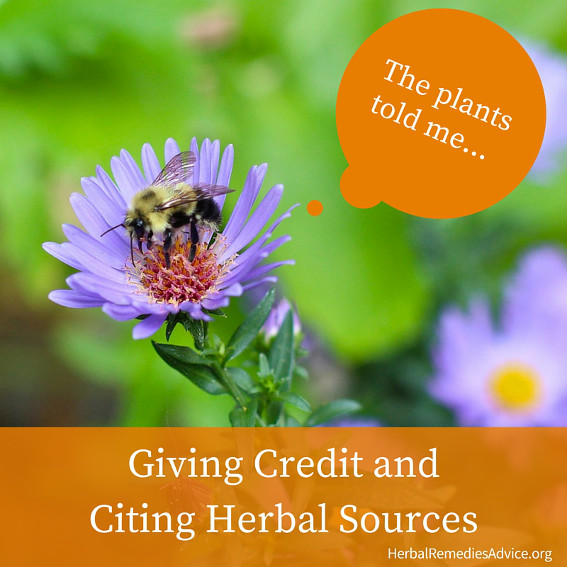Get weekly tips, recipes, and my Herbal Jumpstart e-course! Sign up for free today.

Giving Credit and Citing Herbal Sources
Share this! |
|
Lately I’ve been asked by several people about the correct way to cite sources or provide references within herbal articles.
While
I don’t feel like I am the most qualified person to answer this I
thought I would take a stab at it. I would love to hear other’s comments
below or in their own blog posts.
First I would like to break this up into two different categories.
1. Citing sources when writing a book or a professional article (such as for the JAHG).
2. Citing sources in more informal circumstances such as blog posts, class materials/handouts, etc.
The method of citations in professional circumstances is usually determined by the publication itself. They will provide you with citation guidelines such as which citation format to use. In these types of publications citations will be more frequent. You’ll need to provide citations for any claims you make, any studies you reference or any material that is not strictly your own.
For the purposes of this article I am going to focus on more informal circumstances since this is what most commonly affects the herbalists I work with.
Four Things that Need to Be Cited
- Ideas and concepts learned from other sources.
- Quotes
- Recipes
- Any claims about herbs. (For example, instead of merely writing “studies show,” provide citations to specific studies.)
Why You Should Provide Citations
If you look around at the majority of herbal articles written by grassroots herbalists you’ll see that citations and references are few and far between. Is it even necessary?
YES!
Here are some important reasons why citations are important.
1. Honoring and Respecting Other Herbalists
Citing or referencing the original source who inspired you or who you have learned from is a way to honor and respect that source of information.
Sometimes people may feel that saying they learned something from somewhere else puts them in a bad light. Not at all! First of all we all learned everything somewhere. None of us were born knowing any facts about herbalism or any recipes or any diagnostics. We all had to learn this from somewhere, whether that be another herbalist, a medical researcher or a plant!
Taking the time to acknowledge our teachers is a way to honor and respect them. I love to remember my teachers while I am teaching and writing. It gives me a sense of purpose and helps remind me that I am part of a greater whole. I don’t stand alone, I am standing on the shoulders of my own teachers.
2. You’ll Be Taken More Seriously
Are you trying to change people’s opinions? To help them see the value of medicinal herbs?
Writing
an article with a lot of claims about medicinal herbs but without
supporting evidence will make people question the validity of what you
are saying.
3. Not Citing Materials Reflects Poorly on Your Integrity
Whether you are doing it out of ignorance or maliciousness, repeating information that you learned from someone else or using other people’s recipes without referencing that original source makes you look dishonest and unethical.
4. It Helps Prevent “Herban Legends”
The act of questioning long-held assumptions by looking for proof can help prevent herbal myths.
It has been a common occurrence that myths about herbs get repeated over and over because no one has stepped in to question the validity of the statement. An example of this is goldenseal. You will commonly hear that goldenseal is a broad-spectrum antibiotic that is good for colds and the flu. Yikes!
In his stellar book on Echinacea and Goldenseal Paul Bergner writes extensively about why goldenseal is not an antibiotic. He cites traditional sources as well as modern day studies to prove his point. I wonder, would goldenseal have been as unethically over-harvested if it hadn’t been wrongly portrayed as a “broad-spectrum antibiotic?”
5. Using Copyrighted Information Without Citations Can Violate Copyright Laws
Up until now I’ve focused on why you may choose to cite something based on your integrity and respect for other herbalists. But the fact of the matter is that a lot of information is copyrighted. Using copyrighted information as your own is against the law. This most often refers to printed materials such as books and magazine articles as well as electronic information, including ebooks and even blog posts.
How Do You Know You Need to Cite Another Herbalist or Source?
Knowing when it is necessary to provide citations can be somewhat of a judgement call.
Some knowledge is considered general knowledge that wouldn’t need to be attributed to one single person. For example, you might say in an article that rose hips are high in vitamin C. If this were an informal article you probably wouldn’t need to cite that since that information is readily found anywhere. If this were a more scientific or professional article you may want to cite a study showing this to be true.
I cite herbalists when I know I learned that specific piece of information from them, whether that is an idea or concept. I also attribute direct quotes and give credit for recipes.
What About Recipes?
Basic recipes such as how to make a syrup, an elixir or tincture don’t need to be cited.
If you are using someone’s specific recipe then you need to give credit and you may possibly need permission.
There’s a general rule of thumb that, if you dramatically change a recipe in three ways, then it can become “yours” and no citation is needed. However, if you are highly inspired by someone’s herbal recipe then it’s just good manners to say “This was inspired by…”
How to Cite Sources
Specific formats
As
a reminder, there are specific sets of guidelines for citations in
every profession. The APA format is specifically for behavioral sciences
but is a popular and easy-to-follow format. You can see a tutorial of
the APA format here.
Another popular style is the MLA. This is commonly used in the liberal arts and humanities. You can read more about the MLA style here.
Need help with formatting your citation? Herbalist and friend Victoria Debra Bray told me about this citation machine that helps you generate citations within a certain format.
Informal
I cite sources informally by citing the person and, if applicable, the article, book, study or course where that specific information is included. I generally cite this within the article as well as at the end in a resources section. Keep in mind that this is truly informal and is not up to professional standards.
Attribution of Quotes
If you are quoting someone word for word then you’ll need to attribute that quote. This applies whether or not the quote comes from an article or book or from a personal conversation. Here’s a guide on quote attribution in the MLA style.
Can You Copy and Paste Entire Articles or Blog Posts Onto Your Own Website As Long As You Give Credit?
No.
There are two reasons why you should never copy and paste entire blog posts and put them on your own blog or website.
The
first reason is that it is illegal to take an entire article and copy
and paste it somewhere else, even if you provide a link back to the
original source. It violates copyright law.
The second reason is that this really doesn’t help you and can actually hinder you as far as search engines go. Search engines have little bots running around to determine how far up sites should rank in their search engines. If you have duplicated content on your site then search engines will penalize you by putting your site much lower on the search engine rankings. Unfortunately, if you steal my entire articles/blog posts for your own site we both get penalized.
If you really want to share someone’s article on your own website the best thing to do is include a paragraph to introduce the article along with a link back to the entire original article.
Summary
Providing citations and resources within your herbal articles is a way to show respect to your teachers and substantiate any claims you make. Besides showing personal integrity, citations also mean that you can avoid plagiarism of copyrighted materials, which can become a legal matter.
For most grassroots herbalists, using informal citations will probably suffice; however, I could see a good argument for adopting professional standards, especially for those who want to be seen as professionals.

Rosalee is an herbalist and author of the bestselling book Alchemy of Herbs: Transform Everyday Ingredients Into Foods & Remedies That Healand co-author of the bestselling book Wild Remedies: How to Forage Healing Foods and Craft Your Own Herbal Medicine. She's a registered herbalist with the American Herbalist Guild and has taught thousands of students through her online courses. Read about how Rosalee went from having a terminal illness to being a bestselling author in her full story here.
